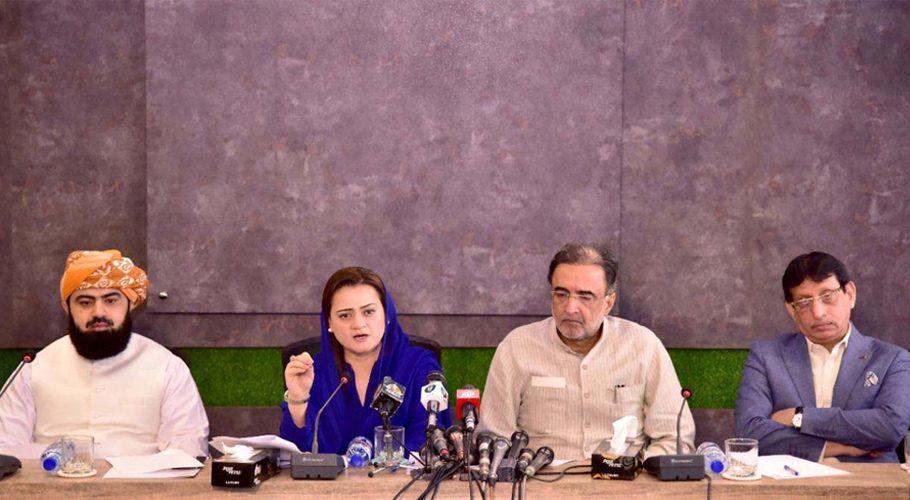ISLAMABAD: The federal cabinet had accorded approved administrative and austerity measures to overcome load-shedding and conserve fuel and energy.
Minister for Information and Broadcasting Marriyum Aurangzeb was addressing a news conference after the cabinet meeting chaired by Prime Minister Shehbaz Sharif.
She said the decision was taken to steer the country out of the prevailing “extraordinary situation” by bridging the demand and supply gap of electricity/
She said the decisions including 40 percent reduction in the petrol quota of government officials and cabinet members, restoration of Saturday as a weekly off, ban on official foreign trips, procurement of luxury items and vehicles and others would come into effect at once.
Marriyum said the comprehensive plan was chalked out by the Power Division and other relevant departments in line with the directions of the prime minister who held meetings and consultations to overcome the load-shedding across the country.
She said the cabinet was briefed on the prevailing power crisis which had aggravated due to “extraordinary heat wave” and climatic changes. There was a huge gap between demand and supply of electricity as the country was producing 21,000 MW against the requirement of 28,400 MW, she noted.
Marriyum said the cabinet approved the three and a half hours daily load-shedding schedule till June 15. With more power plants becoming functional till then, the load-shedding duration would be reduced to three hours, from June 25-29 to two and a half hours and from June 30 to two hours.
Fuel quota slashed
The minister said the cabinet also discussed renewable energy projects, including solar and wind energy so that cheap energy could be produced.
As regards the steps proposed for the conservation of power and energy, she said there was a suggestion of 33 per cent reduction in the petroleum quota for government officials, but the cabinet decided 40 percent cut. The decision would also be applicable on cabinet members.
At a time when the common people were facing problems due to the energy crisis, it was imperative for the cabinet members set an example by conserving energy, she added.
The minister said the cabinet decided to restore the Saturday weekly off with immediate effect as two holidays would save $386 million a year and reduce the import bill by Rs77 billion.
She said the prime minister constituted a committee to review the work from home proposal for Friday so that efficiency should not be affected.
She added the decision for early closure of markets was deferred as the matter would be taken up with the provincial governments in the National Economic Council meeting on Wednesday and the business community would also be taken into the confidence.
The minister said switching off street lights on alternate days also came under discussion and it was decided to coordinate with the provincial authorities in that regard.
Tune-up centre
She said as the people mostly did not care about the regular maintenance of their vehicles, it was decided that the existing network of tune-up centres would be expanded across the country in consultation with the provincial authorities.
The tune-up centres, she said, would play a monitoring and advisory role for the vehicle owners to improve the fuel efficiency of their engines. According to a study, she added regular monitoring and tuning of engines would have a 40 percent impact on fuel consumption.
She said the model, which was introduced in Punjab during the Shehbaz Sharif-led government in the province, would be replicated across the country. Steps would also be taken to enhance farmers’ access to such dedicated centres, so as to ensure repair and maintenance of their tractors, she added.
Buying vehicles banned
Marriyum said the cabinet accorded approval to an awareness campaign at the national level to sensitize the people about energy conservation. The drive would be launched on Wednesday. As a part of the austerity measures, she said, official meetings would also be held in virtual formats to avoid unnecessary travel.
She said the cabinet banned procurement of all types of vehicles by the government departments. Exceptions were given for the utility vehicles, including ambulances, and for educational and solid waste management purposes.
Foreign trips banned
She also said the treatment of government officials and cabinet members from abroad was banned. She said a ban was also imposed on the purchase of luxury items, including furniture, for the government offices.
The official foreign visits of government officials and cabinet were banned, while a committee take a decision about obligatory and unavoidable bilateral visits.
Similarly, she said, lunches, dinners and hi-teas were banned in all the government departments, including allied and autonomous bodies, which would be monitored by inspection committees. Marriyum said the cabinet decided to bring down consumption of utility services at government offices by 10 percent.





































